

Generations (book) The Strauss–Howe generational theory, created by authors William Strauss and Neil Howe, identifies a recurring generational cycle in American history.
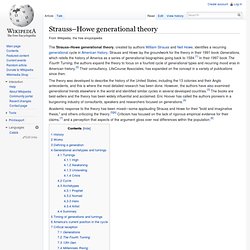
Strauss and Howe lay the groundwork for the theory in their 1991 book Generations, which retells the history of America as a series of generational biographies going back to 1584.[1] In their 1997 book The Fourth Turning, the authors expand the theory to focus on a fourfold cycle of generational types and recurring mood eras in American history.[2] Their consultancy, LifeCourse Associates, has expanded on the concept in a variety of publications since then. The theory was developed to describe the history of the United States, including the 13 colonies and their Anglo antecedents, and this is where the most detailed research has been done. History[edit]
Neil Howe. Neil Howe is an American historian, economist, and demographer.
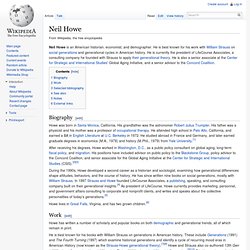
He is best known for his work with William Strauss on social generations and generational cycles in American history. He is currently the president of LifeCourse Associates, a consulting company he founded with Strauss to apply their generational theory. He is also a senior associate at the Center for Strategic and International Studies' Global Aging Initiative, and a senior advisor to the Concord Coalition.
Biography[edit] Howe was born in Santa Monica, California. After receiving his degrees, Howe worked in Washington, D.C., as a public policy consultant on global aging, long-term fiscal policy, and migration. Strauss-Howe generational theory. Boomerang Generation. A boomerang returns to where it was sent from Boomerang generation is a term applied to the current generation of young adults in Western culture.[1][2][3] They are so named for the frequency with which they choose to cohabitate with their parents after a brief period of living on their own – thus boomeranging back to their place of origin.
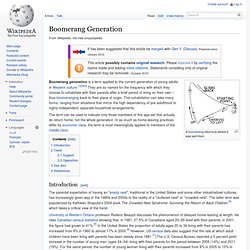
This cohabitation can take many forms, ranging from situations that mirror the high dependency of pre-adulthood to highly independent, separate-household arrangements. The term can be used to indicate only those members of this age-set that actually do return home, not the whole generation. In as much as home-leaving practices differ by economic class, the term is most meaningfully applied to members of the middle class. Introduction[edit] University of Western Ontario professor Roderic Beaujot discusses the phenomenon of delayed home-leaving at length. Trend[edit] William Strauss. William Strauss (February 5, 1947 – December 18, 2007) was an American author, historian, playwright, theater director, and lecturer.
As a historian, he is known for his work with Neil Howe on social generations and for their theory of generational cycles in American history. He is also well known as the co-founder and director of the satirical musical theater group the Capitol Steps, and as the co-founder of the Cappies, a critics and awards program for high school theater students. Biography[edit] Strauss was born in Chicago and grew up in Burlingame, California. Millennialism. This is an overview of both Christian and non-Christian Millennialism.
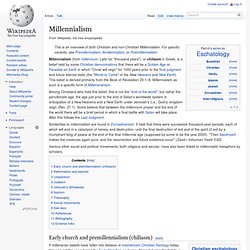
For specific variants, see Premillennialism, Amillennialism, or Postmillennialism. Millennialism (from millennium, Latin for "thousand years"), or chiliasm in Greek, is a belief held by some Christian denominations that there will be a Golden Age or Paradise on Earth in which "Christ will reign" for 1000 years prior to the final judgment and future eternal state (the "World to Come" of the New Heavens and New Earth).
This belief is derived primarily from the Book of Revelation 20:1–6. Millennialism as such is a specific form of Millenarianism. Among Christians who hold this belief, this is not the "end of the world", but rather the penultimate age, the age just prior to the end of Satan's worldwide system in anticipation of a New Heavens and a New Earth under Jehovah's (i.e., God's) kingdom reign (Rev. 21:1). Similarities to millennialism are found in Zoroastrianism. Early church and premillennialism (chiliasm)[edit] Generation Y's goal? Wealth and fame. By Sharon Jayson, USA TODAY Ask young people about their generation's top life goals and the answer is clear and resounding: They want to be rich and famous.
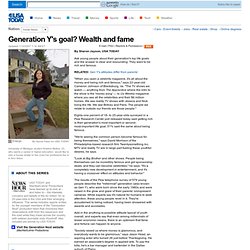
RELATED: Gen Y's attitudes differ from parents' "When you open a celebrity magazine, it's all about the money and being rich and famous," says 22-year-old Cameron Johnson of Blacksburg, Va. "The TV shows we watch — anything from The Apprentice where the intro to the show is the 'money song' — to Us Weekly magazine where you see all the celebrities and their $6 million homes. We see reality TV shows with Jessica and Nick living the life. Eighty-one percent of 18- to 25-year-olds surveyed in a Pew Research Center poll released today said getting rich is their generation's most important or second-most-important life goal; 51% said the same about being famous. "We're seeing the common person become famous for being themselves," says David Morrison of the Philadelphia-based research firm Twentysomething Inc.
Generation Y - Characteristics of Generation Y. Born in the mid-1980's and later, Generation Y legal professionals are in their 20s and are just entering the workforce.

With numbers estimated as high as 70 million, Generation Y (also known as the Millennials) is the fastest growing segment of today’s workforce. As law firms compete for available talent, employers cannot ignore the needs, desires and attitudes of this vast generation. Below are a few common traits that define Generation Y. Tech-Savvy: Generation Y grew up with technology and rely on it to perform their jobs better. Drunkeness In Christchurch. Generation Y: They've arrived at work with a new attitude. Generation Y: They've arrived at work with a new attitude By Stephanie Armour, USA TODAY They're young, smart, brash.

They may wear flip-flops to the office or listen to iPods at their desk. They want to work, but they don't want work to be their life. This is Generation Y, a force of as many as 70 million, and the first wave is just now embarking on their careers — taking their place in an increasingly multigenerational workplace. Get ready, because this generation — whose members have not yet hit 30 — is different from any that have come before, according to researchers and authors such as Bruce Tulgan, a founder of New Haven, Conn. This age group is moving into the labor force during a time of major demographic change, as companies around the USA face an aging workforce. That speak-your-mind philosophy makes sense to Katie Patterson, an assistant account executive at Edelman Public Relations in Atlanta.
"We are willing and not afraid to challenge the status quo," she says.